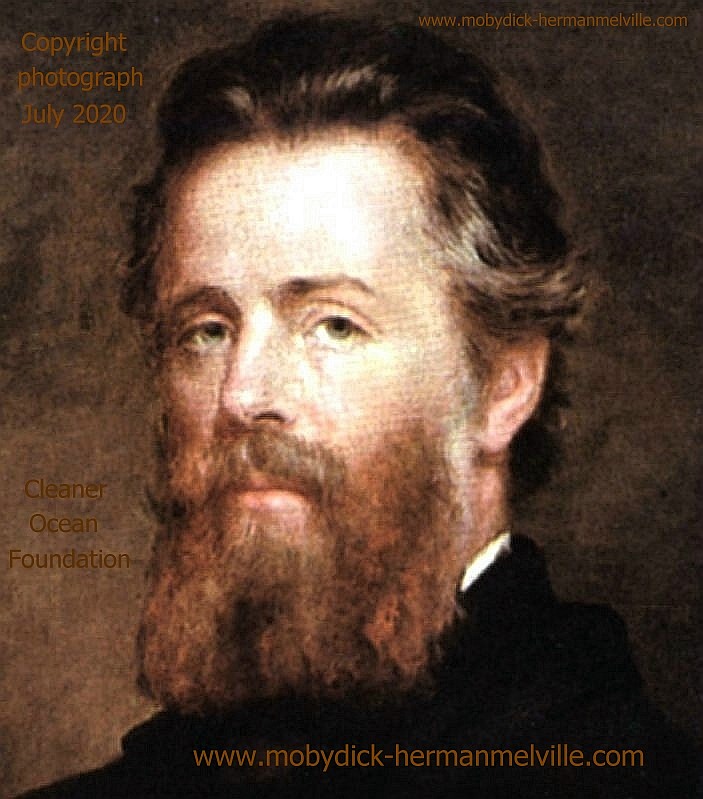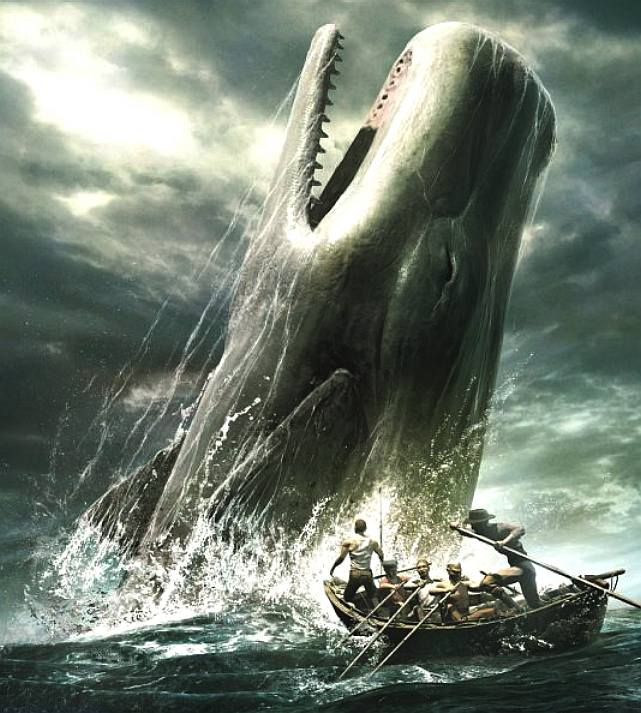
Herman
Melville was the author of a story about what we'd now consider an illegal activity,
the commercial hunting of whales for oil and meat. Whaling is still
carried out by Japan, Iceland and Canada, among other nations, though
most nations voluntarily abstain in the interests of conserving these
magnificent animals - as per International
Whaling Commission guidelines.
Back
<<<
CHAPTER 98. Stowing Down and Clearing Up.
Already has it been related how the great leviathan is afar off descried from the mast-head; how he is chased over the watery moors, and slaughtered in the valleys of the deep; how he is then towed alongside and beheaded; and how (on the principle which entitled the headsman of old to the garments in which the beheaded was killed) his great padded surtout becomes the property of his executioner; how, in due time, he is condemned to the pots, and, like Shadrach, Meshach, and Abednego, his spermaceti, oil, and bone pass unscathed through the fire;—but now it remains to conclude the last chapter of this part of the description by rehearsing—singing, if I may—the romantic proceeding of decanting off his oil into the casks and striking them down into the hold, where once again leviathan returns to his native profundities, sliding along beneath the surface as before; but, alas! never more to rise and blow.
While still warm, the oil, like hot punch, is received into the six-barrel casks; and while, perhaps, the ship is pitching and rolling this way and that in the midnight sea, the enormous casks are slewed round and headed over, end for end, and sometimes perilously scoot across the slippery deck, like so many land slides, till at last man-handled and stayed in their course; and all round the hoops, rap, rap, go as many hammers as can play upon them, for now, EX OFFICIO, every sailor is a cooper.
At length, when the last pint is casked, and all is cool, then the great hatchways are unsealed, the bowels of the ship are thrown open, and down go the casks to their final rest in the sea. This done, the hatches are replaced, and hermetically closed, like a closet walled up.
In the sperm fishery, this is perhaps one of the most remarkable incidents in all the business of whaling. One day the planks stream with freshets of blood and oil; on the sacred quarter-deck enormous masses of the whale's head are profanely piled; great rusty casks lie about, as in a brewery yard; the smoke from the try-works has besooted all the bulwarks; the mariners go about suffused with unctuousness; the entire ship seems great leviathan himself; while on all hands the din is deafening.
But a day or two after, you look about you, and prick your ears in this self-same ship; and were it not for the tell-tale boats and try-works, you would all but swear you trod some silent merchant vessel, with a most scrupulously neat commander. The unmanufactured sperm oil possesses a singularly cleansing virtue. This is the reason why the decks never look so white as just after what they call an affair of oil. Besides, from the ashes of the burned scraps of the whale, a potent lye is readily made; and whenever any adhesiveness from the back of the whale remains clinging to the side, that lye quickly exterminates it. Hands go diligently along the bulwarks, and with buckets of water and rags restore them to their full tidiness. The soot is brushed from the lower rigging. All the numerous implements which have been in use are likewise faithfully cleansed and put away. The great hatch is scrubbed and placed upon the try-works, completely hiding the pots; every cask is out of sight; all tackles are coiled in unseen nooks; and when by the combined and simultaneous industry of almost the entire ship's company, the whole of this conscientious duty is at last concluded, then the crew themselves proceed to their own ablutions; shift themselves from top to toe; and finally issue to the immaculate deck, fresh and all aglow, as bridegrooms new-leaped from out the daintiest Holland.
Now, with elated step, they pace the planks in twos and threes, and humorously discourse of parlors, sofas, carpets, and fine cambrics; propose to mat the deck; think of having hanging to the top; object not to taking tea by moonlight on the piazza of the forecastle. To hint to such musked mariners of oil, and bone, and blubber, were little short of audacity. They know not the thing you distantly allude to. Away, and bring us napkins!
But mark: aloft there, at the three mast heads, stand three men intent on spying out more whales, which, if caught, infallibly will again soil the old oaken furniture, and drop at least one small grease-spot somewhere. Yes; and many is the time, when, after the severest uninterrupted labors, which know no night; continuing straight through for ninety-six hours; when from the boat, where they have swelled their wrists with all day rowing on the Line,—they only step to the deck to carry vast chains, and heave the heavy windlass, and cut and slash, yea, and in their very sweatings to be smoked and burned anew by the combined fires of the equatorial sun and the equatorial try-works; when, on the heel of all this, they have finally bestirred themselves to cleanse the ship, and make a spotless dairy room of it; many is the time the poor fellows, just buttoning the necks of their clean frocks, are startled by the cry of "There she blows!" and away they fly to fight another whale, and go through the whole weary thing again. Oh! my friends, but this is man-killing! Yet this is life. For hardly have we mortals by long toilings extracted from this world's vast bulk its small but valuable sperm; and then, with weary patience, cleansed ourselves from its defilements, and learned to live here in clean tabernacles of the soul; hardly is this done, when—THERE SHE BLOWS!—the ghost is spouted up, and away we sail to fight some other world, and go through young life's old routine again.
Oh! the metempsychosis! Oh! Pythagoras, that in bright Greece, two thousand years ago, did die, so good, so wise, so mild; I sailed with thee along the Peruvian coast last voyage—and, foolish as I am, taught thee, a green simple boy, how to splice a rope!
Next
>>>
BOOK
CHAPTERS
CHAPTER 1. Loomings.
CHAPTER
2. The Carpet-Bag.
CHAPTER
3. The Spouter-Inn.
CHAPTER
4. The Counterpane.
CHAPTER
5. Breakfast.
CHAPTER
6. The Street.
CHAPTER
7. The Chapel.
CHAPTER
8. The Pulpit.
CHAPTER
9. The Sermon.
CHAPTER
10. A Bosom Friend.
CHAPTER
11. Nightgown.
CHAPTER
12. Biographical.
CHAPTER
13. Wheelbarrow.
CHAPTER
14. Nantucket.
CHAPTER
15. Chowder.
CHAPTER
16. The Ship.
CHAPTER
17. The Ramadan.
CHAPTER
18. His Mark.
CHAPTER
19. The Prophet.
CHAPTER
20. All Astir.
CHAPTER
21. Going Aboard.
CHAPTER
22. Merry Christmas.
CHAPTER
23. The Lee Shore.
CHAPTER
24. The Advocate.
CHAPTER
25. Postscript.
CHAPTER
26. Knights and Squires.
CHAPTER
27. Knights and Squires.
CHAPTER
28. Ahab, Captain.
CHAPTER
29. Enter Ahab; to Him, Stubb.
CHAPTER
30. The Pipe.
CHAPTER
31. Queen Mab.
CHAPTER
32. Cetology.
CHAPTER
33. The Specksnyder.
CHAPTER
34. The Cabin-Table.
CHAPTER
35. The Mast-Head.
CHAPTER
36. The Quarter-Deck.
CHAPTER
37. Sunset.
CHAPTER
38. Dusk.
CHAPTER
39. First Night Watch.
CHAPTER
40. Midnight, Forecastle.
CHAPTER
41. Moby Dick.
CHAPTER
42. The Whiteness of The Whale.
CHAPTER
43. Hark!
CHAPTER
44. The Chart.
CHAPTER
45. The Affidavit.
CHAPTER
46. Surmises.
CHAPTER
47. The Mat-Maker.
CHAPTER
48. The First Lowering.
CHAPTER
49. The Hyena.
CHAPTER
50. Ahab's Boat and Crew. Fedallah.
CHAPTER
51. The Spirit-Spout.
CHAPTER
52. The Albatross.
CHAPTER
53. The Gam.
CHAPTER
54. The Town-Ho's Story.
CHAPTER
55. Of the Monstrous Pictures of Whales.
CHAPTER
56. Of the Less Erroneous Pictures of Whales, and the True
CHAPTER
57. Of Whales in Paint; in Teeth; in Wood; in Sheet-Iron; in
CHAPTER
58. Brit.
CHAPTER
59. Squid.
CHAPTER
60. The Line.
CHAPTER
61. Stubb Kills a Whale.
CHAPTER
62. The Dart.
CHAPTER
63. The Crotch.
CHAPTER
64. Stubb's Supper.
CHAPTER
65. The Whale as a Dish.
CHAPTER
66. The Shark Massacre.
CHAPTER
67. Cutting In
CHAPTER
69. The Funeral.
CHAPTER
70. The Sphynx.
CHAPTER
71. The Jeroboam's Story.
CHAPTER
72. The Monkey-Rope.
CHAPTER
73. Stubb and Flask Kill a Right Whale; and Then Have a Talk
CHAPTER
74. The Sperm Whale's Head—Contrasted View.
CHAPTER
75. The Right Whale's Head—Contrasted View.
CHAPTER
76. The Battering-Ram.
CHAPTER
77. The Great Heidelburgh Tun.
CHAPTER
78. Cistern and Buckets.
CHAPTER
79. The Prairie.
CHAPTER
80. The Nut.
CHAPTER
81. The Pequod Meets The Virgin.
CHAPTER
82. The Honour and Glory of Whaling.
CHAPTER
83. Jonah Historically Regarded.
CHAPTER
84. Pitchpoling.
CHAPTER
85. The Fountain.
CHAPTER
86. The Tail.
CHAPTER
87. The Grand Armada.
CHAPTER
88. Schools and Schoolmasters.
CHAPTER
89. Fast-Fish and Loose-Fish.
CHAPTER
90. Heads or Tails.
CHAPTER
91. The Pequod Meets The Rose-Bud.
CHAPTER
92. Ambergris.
CHAPTER
93. The Castaway.
CHAPTER
94. A Squeeze of the Hand.
CHAPTER
95. The Cassock.
CHAPTER
96. The Try-Works.
CHAPTER
97. The Lamp.
CHAPTER
98. Stowing Down and Clearing Up.
CHAPTER
99. The Doubloon.
CHAPTER
100. Leg and Arm.
CHAPTER
101. The Decanter.
CHAPTER
102. A Bower in the Arsacides.
CHAPTER
103. Measurement of The Whale's Skeleton.
CHAPTER
104. The Fossil Whale.
CHAPTER
105. Does the Whale's Magnitude Diminish?—Will He Perish?
CHAPTER
106. Ahab's Leg.
CHAPTER
107. The Carpenter.
CHAPTER
108. Ahab and the Carpenter.
CHAPTER
109. Ahab and Starbuck in the Cabin.
CHAPTER
110. Queequeg in His Coffin.
CHAPTER
111. The Pacific.
CHAPTER
112. The Blacksmith.
CHAPTER
113. The Forge.
CHAPTER
114. The Gilder.
CHAPTER
115. The Pequod Meets The Bachelor.
CHAPTER
116. The Dying Whale.
CHAPTER
117. The Whale Watch.
CHAPTER
118. The Quadrant.
CHAPTER
119. The Candles.
CHAPTER
120. The Deck Towards the End of the First Night Watch.
CHAPTER
121. Midnight.—The Forecastle Bulwarks.
CHAPTER
122. Midnight Aloft.—Thunder and Lightning.
CHAPTER
123. The Musket.
CHAPTER
124. The Needle.
CHAPTER
125. The Log and Line.
CHAPTER
126. The Life-Buoy.
CHAPTER
127. The Deck.
CHAPTER
128. The Pequod Meets The Rachel.
CHAPTER
129. The Cabin.
CHAPTER
130. The Hat.
CHAPTER
131. The Pequod Meets The Delight.
CHAPTER
132. The Symphony.
CHAPTER
133. The Chase—First Day.
CHAPTER
134. The Chase—Second Day.
CHAPTER
135. The Chase.—Third Day.
Epilogue

Moby
Dick is the antogonist in this story of a great white 'bull' sperm whale that fought back at
whalers who tried to harpoon him.
The idea came to
Herman Melville after
he spent time on a commercial whaler, where stories abounded of the
sinking of the Essex in 1821 and Mocha
Dick, a giant sperm whale that sank around 20 ships, before being
harpooned in 1838.
Herman
realised how fixated the sailors became, and he also became with the
thought that there was a whale that nobody could catch, that represented
a real risk to the whalers hunting whales, in that it was more sport
than commercial operations.
Without
any doubt this is one of the greatest novels coming out of America at
this time and way off the beaten track, making it so interesting,
reflecting the state of whaling and the economic importance in the
developing the nation - giving the general public a taste of something
adventurous that most people never think about.
Many
films and graphic novel adaptations have been inspired by the writings
of Herman Melville, from Marvel
and Disney
comics with good cause.
One
such production in 2020 is a graphic novel about a giant humpback whale
called Kulo
Luna, that sinks a modern whaling boat, much as depicted in Herman
Melville's Moby
Dick, except that is this day and age whales have explosive harpoons
to contend with, and sonar, from which there is no escape.
Please use our
A-Z INDEX to
navigate this site

